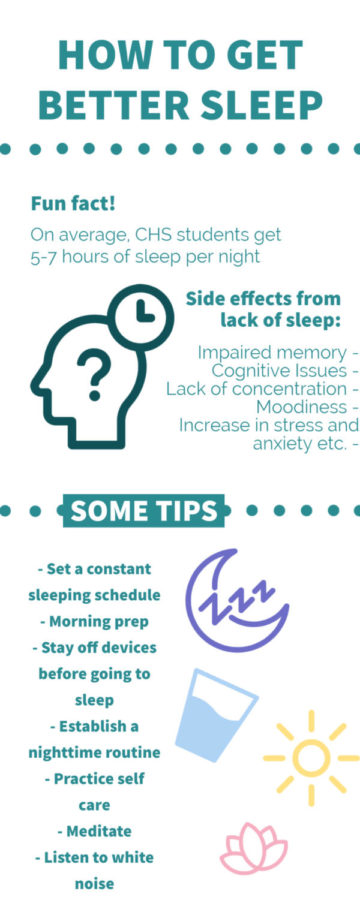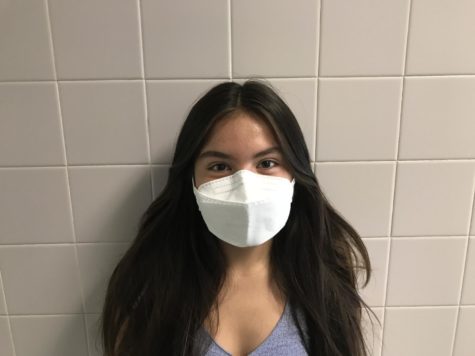Catching Z’s: tips help students get better sleep
For more information, go to sleepfoundation.org Recorded 100 students responses from an Instagram poll as well as a poll taken in the CHS cafeteria from Oct. 11 to Oct. 15 to see the average amount of sleep CHS students get.
December 10, 2021
Sleep deprivation is an issue many high school students face. On average, a student gets five to seven hours of sleep according to the Sleep Foundation, when they should actually be getting eight to ten hours of sleep. Many factors in a student’s life play a role in this sleep deprivation pattern. As an example, student athletes have to balance sports on top of schoolwork.
“Most days after school I have to go to the weight room, then I have to go to soccer practice and I get home at nine,” freshman Sammy Emigh said. “After that, I have to do all of my homework, which takes a while. All of these things just build up and I get really stressed.”
According to the Better Health Channel, an increase in stress, mood swings and lack of concentration are only some of the side effects caused by poor sleeping habits. However, this is not an unsolvable issue. There are a variety of techniques students can use to try to improve their sleep.
Meditation
This is a method that has been used for hundreds of years to urge a sense of awareness and focused attention. Find a relaxing, safe place to focus on breathing, the mind and body. Instead of dwelling on negative and worrisome events, try to engage and pivot your attention to what you’re doing at that moment in time. There are some free meditation apps that you can download on a device like Headspace and Calm.
According to the National Center for Biotechnology Information, meditation also helps to increase melatonin levels, which is a hormone that helps people sleep longer and fall asleep more quickly.
“Sometimes, when I feel all over the place and stressed, I go to my room and find a comfortable spot and just try to clear my thoughts and focus on myself,” freshman Dennis Meza said. “Meditation is important to me because it helps to focus my mind and relax.”
White Noise
According to the Sleep Foundation, white noise is proven to successfully conceal unwanted sounds, improve sleep quality and help better one’s concentration. White noise varies from high to low frequencies that play at the same intensity level
“I like white noise because it helps me relax,” freshman Amber Casey said. “The sounds are just really soothing.”
Sleep quality can be improved by getting a white noise machine or downloading an app. However, if these options are not available, white noise can also be produced; for example, leaving a fan on at a low setting can act as a substitute.
Setting a Nighttime Routine
Establishing a nighttime routine is important for maintaining both good physical and mental wellbeing. According to Southern New Hampshire University, taking extra time out of the day to pay special attention to oneself is clinically proven to reduce depression, lower the risk of heart disease, improve energy levels and more. According to the Sleep Foundation, some extra steps one can take to improve their sleep can be prepping for the next day, doing a relaxing activity like reading a book or meditating, listening to white noise, practicing good hygiene, and more.
“I have a skincare routine, listen to white noise, get my stuff ready for the following day and try to stay off my phone at least 30 mins before I go to sleep,” Casey said. “I like to do these things because personally, they help me fall asleep.”




